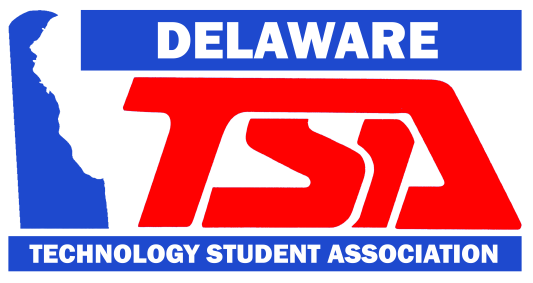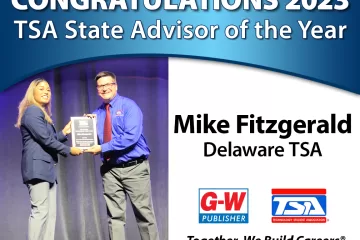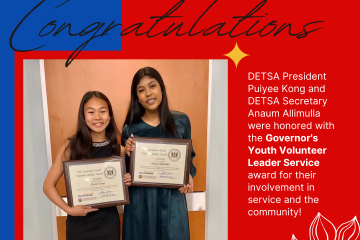
Mike Fitzgerald and son leading the Delaware delegation at 2023 Technology Student Association Conference in Louisville, Kentucky.
MARCH 2024- Longtime ITEEA member and current Board Member, Mike Fitzgerald, DTE, was recently named “State Advisor of the Year” by the Technology Student Association (TSA). The award is presented to a TSA state advisor who has provided exemplary service and support to TSA for the last three years. Mike currently serves as the Technology and Engineering Education Associate with the Delaware Department of Education. Before that, he was a classroom teacher as well as an Education Specialist for the Indiana Department of Education.
ITEEA sat down with Mike to learn more about him and his long career of supporting Technology and Engineering students and teachers.
HOW DID TECHNOLOGY AND ENGINEERING EDUCATION BECOME YOUR CAREER PATH?
I believe I chose Technology and Engineering Education (TEE) due to my deep and lasting passion for STEM subjects coupled with the joy of sharing this knowledge to support the growth of young learners. By instilling a love for T&E, teachers can inspire the next generation of innovators and problem solvers to be better prepared to shape the future of our world. Our profession allows educators to contribute to the growth of students’ critical-thinking skills and their ability to apply knowledge to real-world challenges.
Moreover, TEE enables educators to facilitate hands-on learning experiences in a field where learning by doing is central to the educational process. Students engage in practical projects, experiments, and problem-solving activities that not only reinforce theoretical concepts, but also develop essential skills, such as teamwork, creativity, and adaptability. This dynamic approach to education empowers students to tackle complex problems and encourages them to become lifelong learners.
What I find exciting is how what we teach helps our students bridge the gap between the classroom and the job market, preparing them for promising career opportunities with knowledge and skills to thrive in a rapidly evolving technological landscape. I am happy to know that I have helped equip students with the tools they need to make meaningful contributions to society and to meet the demands of the future.
WHY DID YOU DECIDE TO LEAVE THE CLASSROOM?
In 2003 I had earned state and national recognition for program excellence, had served in the NASA NEWMaST program, was professionally active, and had delivered workshops for ITEA (now ITEEA), Technology Educators of Indiana (TEI), and Civil Air Patrol (CAP), and had published many articles. I did not know how profoundly my life was about to change.
I was devastated upon receiving a Reduction in Force (RIF) notice from my district due to budget cuts. Not only was my Local Education Agency (LEA) having financial difficulties, so too were most districts in the state of Indiana. As a teacher, I was in a precarious environment. I was above the mid-point of most teacher pay scales due to my experience and, due to the economy, schools simply were not looking to replace teachers who were RIF—if they were looking at all they wanted early career teachers. Despite a search for a new position, there were no schools hiring experienced educators at that time. Fortunately for me, Gregg Steele, Technology Education specialist at the state Department of Education, who had long admired my work, was planning to retire and personally came to my school to encourage me to apply. I am grateful to Gregg because, although I didn’t know it at the time, he was gifting me the opportunity to shape learners into leaders!
While I miss the classroom, service through state leadership has allowed me to affect broader change and influence policies and procedures to support teachers of Career and Technical Education (CTE). I have the opportunity to shape the overall learning environment, develop curriculum, and create supportive partnerships for the benefit of educators and students. While it may not have been my intention to leave the classroom, I am grateful for the opportunities I have had to make an enduring impact on education and student success.

Mike Fitzgerald, Rebecca Taylor, Ryan Welch, and Tony Santino representing TECA at the 1993 ITEA Conference in Charlotte, North Carolina.
WHAT DREW YOU TO BECOME SO INVOLVED IN ORGANIZATIONS LIKE TSA AND ITEEA?
I was initially drawn into joining a professional organization and accepting leadership roles within it as an undergraduate student at Ball State University when I was encouraged by Dr. Richard Seymour to serve as vice-president of the BSU TECA (now TEECA) chapter. From that experience I learned how rewarding it is to work on a team to provide leadership and service to others.
As a part of TECA, I also attended my first ITEA conference in 1992, which was held in Charlotte, NC. There I learned how professional organizations serve as a structured platform for networking and knowledge-sharing among like-minded individuals. It was exciting to meet thought leaders and I enjoyed service as a member, attending sessions to gain valuable resources, knowledge, and insights within our profession. I also treasured the opportunities to connect with peers and mentors.
Since starting my career in TEECA, ITEEA, and TSA I have earned opportunities for growth and learned while leading. The growth came about by accepting leadership roles, networking, and contributing to positive change. Each leadership position has helped me develop essential skills such as decision-making, communication, and project management. Being a leader within our professional organizations has helped open doors to new opportunities and collaborations, fostering my personal and professional development. I am grateful for how membership has helped me learn how to give back to the community while helping me advance my career and personal growth.
WHAT ARE WE GETTING RIGHT ABOUT HELPING ALL STUDENTS BECOME TECHNOLOGICALLY AND ENGINEERING LITERATE?
I believe what we are getting right is the focus on the knowledge and skills that will be fundamental for success in the 21st century. In our increasingly technology-driven world, technological literacy is essential for everyday life. From using smartphones and computers to understanding how the internet works, technological literacy is key for communication, information access, and digital citizenship. Moreover, an understanding of technology enables students to be more informed and responsible users, safeguarding their digital privacy and security.
Engineering and technological literacy is essential for solving complex problems and driving innovation. In our rapidly evolving global economy, engineering knowledge and skills are in high demand. Learners with these skills are empowered as makers to design and build solutions to real-world challenges, the very real challenges we face today—and tomorrow. Our learners are who will solve for the 14 Grand Challenges identified by the National Academy of Engineering. It will be our students who apply critical thinking and creativity to solve for worldwide access to clean water, advancements in better medicines, secure our cyberspace, engineer tools of discovery, and engineer our civil infrastructure for the future.
I believe ITEEA’s Standards for Technological and Engineering Literacy equips students with the ability to adapt and thrive in an ever-changing world. It fosters adaptability and cross-disciplinary thinking, enabling them to navigate new technologies and interdisciplinary challenges. As students become technologically and engineering literate, they not only prepare themselves for a wide array of career opportunities but also gain the tools to make informed decisions, contribute to innovation, and address global issues, making them well-rounded, capable, and responsible members of society.

Mike Fitzgerald has had an enormously positive impact on the field of TEE.
WHAT HAVE BEEN THE BIGGEST REWARDS OF YOUR CAREER AND INVOLVEMENT IN ORGANIZATIONS LIKE TSA AND ITEEA?
The biggest rewards of my career are reflective of how I have been able to use the skills and knowledge I have earned in organizations like TEECA, TSA, and ITEEA to support the growth of the learners I serve. I have had the opportunity to inspire and mentor countless students and nurture their passion for technology, engineering, and leadership. I have the opportunity to witness their growth as they emerge into confident, knowledgeable, and skilled individuals. It is exciting to help them to pursue their careers in STEM fields and to become the leaders of tomorrow, beginning today.
WHO WOULD YOU CONSIDER YOUR MOST IMPACTFUL MENTOR?
I have been and continue to be surrounded by mentors, but the one I’d like to mention first is my spouse. I grew up in a small town with few opportunities and while I was known to have a strong work ethic—that ethos was not academic. I was more interested in building bikes from scrap parts and reading Popular Science and Popular Mechanics. I was mostly well-behaved, but I did enjoy trying out crazy ideas and having fun making solutions to problems using tools, materials, and inventiveness. I was short on money and did not always have the skills, but I always liked the challenge: to make something better, using the resources at hand, to solve with what I had rather than wish for what I didn’t.
It was my wife (girlfriend at the time) who first inspired me. She knew that, while I had not practiced many academic skills, I had the ability and capacity and that what I needed was scaffolding. Her guidance and support included practical knowledge as well as emotional and moral support. I grew from her help.
In addition to my spouse, I can easily share that I have and continue to have many mentors even today. These are the people I look up to on a daily basis and include the teachers I support, the students I have taught, those whom I have led in TSA, the colleagues with whom I have worked with through ITEEA, fellow state DOE leaders, and all of the TSA members. I believe that the most impactful mentors for any individual are those whom we meet on our journey in life when we are focused on growing knowledge and experiences together. I am reminded of something that former ITEEA Executive Director Kendall Starkweather once shared. He was musing on how the important things in life are not measured by an award, but instead are simply measured as life’s work and that the greatest gift we can give is to invest in each other for the growth of all.
 Read the article here:
Read the article here:
An Interview with the TSA State Advisor of the Year: Mike Fitzgerald, DTE
(Technology and Engineering Education – March 2024)


